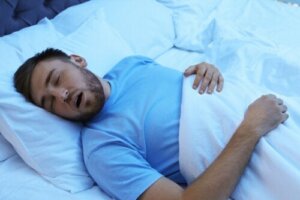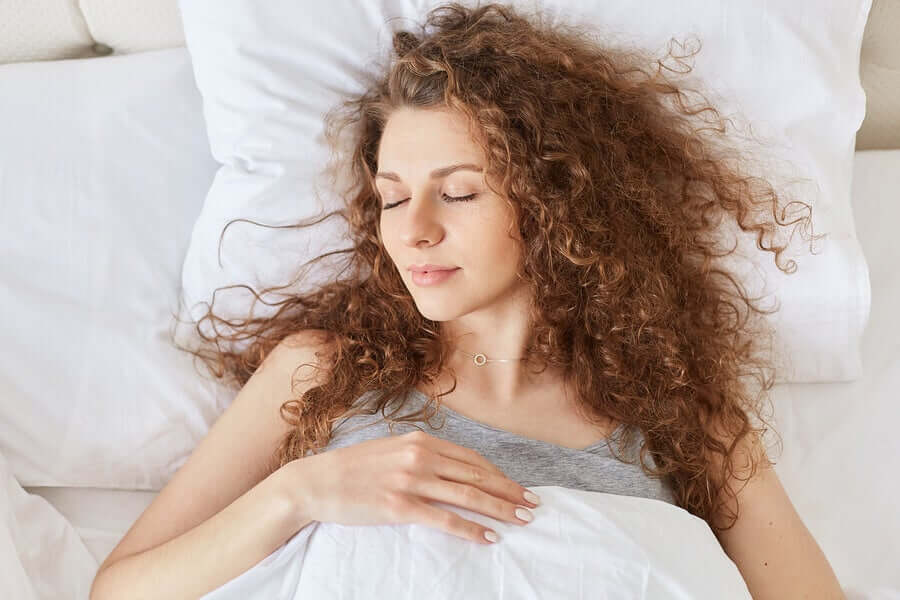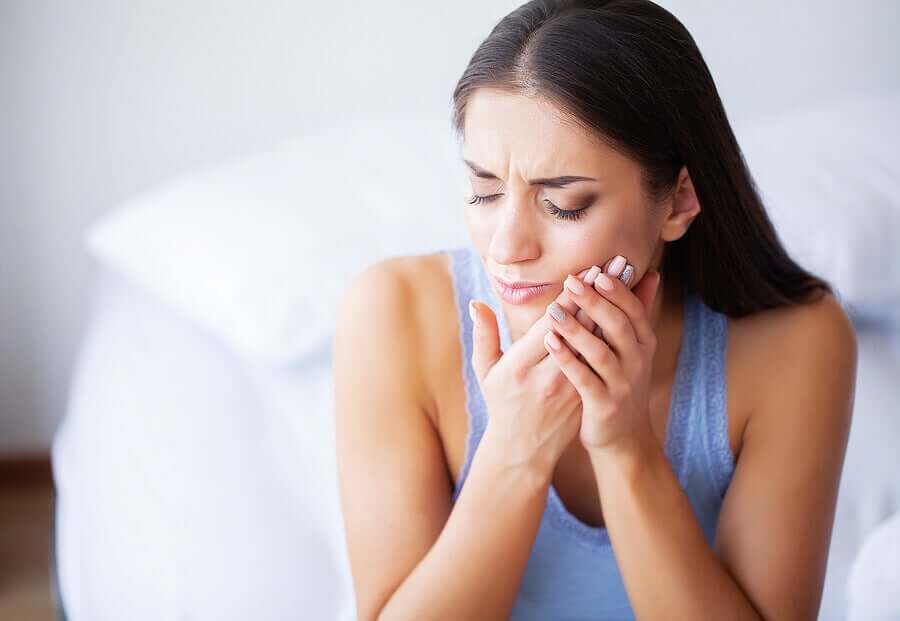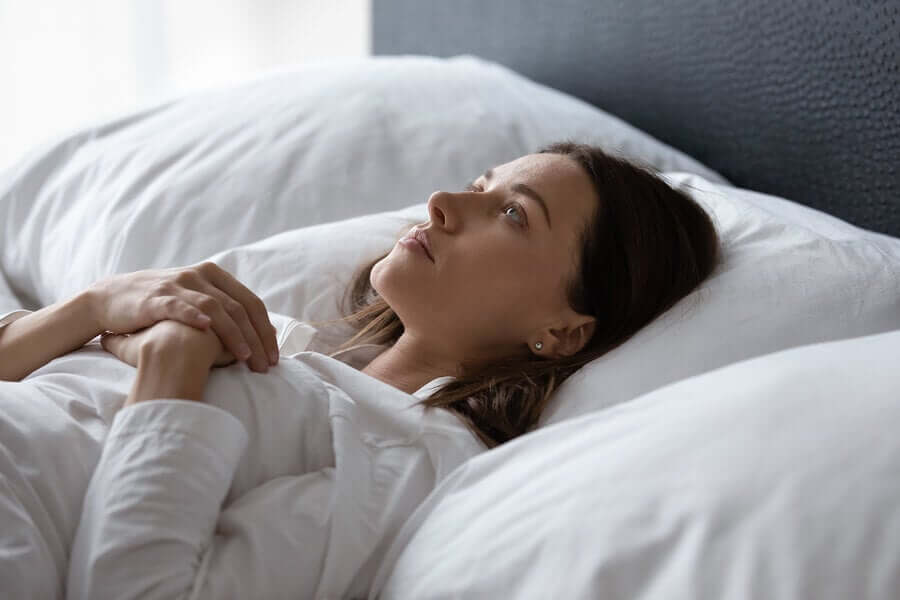7 Interesting Things that Your Body Does in Deep Sleep


Reviewed and approved by the doctor Nelton Abdon Ramos Rojas
One of the main things your body needs is at least eight hours of sleep every day. While you’re in a deep sleep, your body repairs itself and renews its energy levels to take on a new day with the best physical and mental outlook.
What not many people know, however, is that some interesting things take place when you’re asleep. These things can affect your overall health and quality of life. In today’s article, we want to reveal all the things that happen when you fall into a deep sleep. No doubt you’ll be surprised!
1. Your eye movement increases
We go through about five stages during a sleep cycle, the fifth one being the deepest level of sleep. It’s known as the REM phase, or Rapid Eye Movement, and is characterized by the continuous movement of the eyes from front to back. It’s also the time when we experience dreams
According to WebMD, you usually reach this stage of sleep in about 90 minutes and it makes up almost 20% of your total sleep in the night. For now, no one can explain this phenomenon, but it’s believed to be due to the fact that the brain is more active.

One of the interesting things that occurs when you’re in a deep sleep is known as rapid eye movement.
Like this article? You may also like to read: Relaxing Infusions That Will Help You Sleep
2. You produce growth hormone
One of the reasons why getting good deep sleep at night is so important is because it’s when your body secretes hormones like human growth hormone.
According to the Mayo Clinic, these hormones are essential for the proper development of babies and children. Likewise, the human growth hormone is also required to keep tissue and organs healthy throughout our lives
3. Your kidneys slow down and you burn calories
During the day, your kidneys work hard to filter toxins from your bloodstream and produce urine. During the night, their efforts slow down and you produce less urine than you would during the day.
That explains why you might not need to get up to go to the bathroom at night. Likewise, in the morning, you may notice your urine is darker than usual. According to a study involving animals published in Nature Communications, a protein called connexin43 could be responsible for helping the kidneys have a circadian rhythm that controls their capacity, which is lower during the day.
4. You grind your teeth
This less-common occurrence could be caused by stress or because your teeth are not properly aligned. Dental professionals refer to this as bruxism, which can sometimes cause jaw pain and other complications.
There are no conclusive studies regarding why bruxism is more frequent during the night. However, experts believe that it’s because, when we’re sleeping, we lose the conscious ability to detain this involuntary reflex.

5. Your body makes sudden movements
This reflex is very common in all human beings and takes place when we reach the deepest sleep phase. Suddenly you jump or feel a strong jolt out of bed. While this can be annoying, it’s perfectly normal and shouldn’t be a cause for concern. What’s going on is that your brain is preparing itself for the shift in sleep cycles and sometimes it gets misinterpreted as a fall.
According to a study in the Journal of Neurosciences in Rural Practice, there are several theories regarding why this phenomenon occurs. One of the theories suggests that it’s a cerebral defense mechanism. To be more specific, the brain associates the total relaxation of the body with falling, and therefore the muscles contract. However, none of the theories regarding this phenomenon are conclusive.
6. The brain discards what it doesn’t need when in deep sleep
Your brain builds up a lot of toxins throughout the day, which it discards by means of a cleaning process at night. This process relieves mental fatigue and renews your energy for the next day.
A publication from MEDTube Science suggests that several studies have discovered a link between deep sleep and the elimination of toxins from the brain. This involves a pathway known as the glymphatic system. In a sense, it’s the brain’s way of taking out the trash.
We think you may also find this article interesting: 4 Psychological Benefits of Walking
7. You go into sleep paralysis
Sleep paralysis occurs when you are in the deepest phase of your sleep cycle and is characterized by a nagging sense of immobility while being aware that you’re dreaming. It can be a very frightening occurrence because it’s often accompanied by nightmares in which you’re unable to escape or react in any way.
There’s no conclusive evidence regarding the specific causes of this phenomenon. However, according to Britain’s National Health Service, it could have to do with the following:
- Insomnia
- Interrupted sleep patterns
- Narcolepsy (falling asleep suddenly)
- Post-traumatic stress syndrome
- General anxiety
- Panic attacks
- Family history of sleep paralysis

Sleeping well is synonymous with good health
Sleeping well, along with a regular physical activity routine and a balanced diet is one of the best ways to maintain a healthy lifestyle.
What’s more, experts believe that quality sleep improves concentration, creativity, and physical condition. What’s more, it also reduces the symptoms of stress and anxiety.
It’s important to remember that if you are persistently unable to fall asleep or some of the states mentioned above are very bothersome and repetitive, it’s best to consult with a doctor.
All cited sources were thoroughly reviewed by our team to ensure their quality, reliability, currency, and validity. The bibliography of this article was considered reliable and of academic or scientific accuracy.
- Clínica Mayo. Bruxismo (rechinamiento de los dientes). (2018). mayoclinic.org/es-es/diseases-conditions/bruxism/symptoms-causes/syc-20356095
- F. Roballo. Parálisis del sueño: desenmascarando el fantasma, exploración holística y psicológica. (2016). sifp.psico.edu.uy/sites/default/files/Trabajos%20finales/%20Archivos/tfg_francisco_roballo.pdf
- Clínica Mayo. La hormona del crecimiento humana: ¿Hace más lento el envejecimiento?. (2020). Recuperado el 20 de marzo de 2020.
- Negoro, H., Kanematsu, A., Doi, M., Suadicani, S. O., Matsuo, M., Imamura, M., Okinami, T., Nishikawa, N., Oura, T., Matsui, S., Seo, K., Tainaka, M., Urabe, S., Kiyokage, E., Todo, T., Okamura, H., Tabata, Y., & Ogawa, O. (2012). Involvement of urinary bladder Connexin43 and the circadian clock in coordination of diurnal micturition rhythm. Nature Communications. https://doi.org/10.1038/ncomms1812
- Sathe, H., Karia, S., Desousa, A., & Shah, N. (2015). Hypnic jerks possibly induced by escitalopram. In Journal of Neurosciences in Rural Practice. https://doi.org/10.4103/0976-3147.158797
- Eugene, A. R., & Masiak, J. (2015). The Neuroprotective Aspects of Sleep. MEDtube Science.
This text is provided for informational purposes only and does not replace consultation with a professional. If in doubt, consult your specialist.








